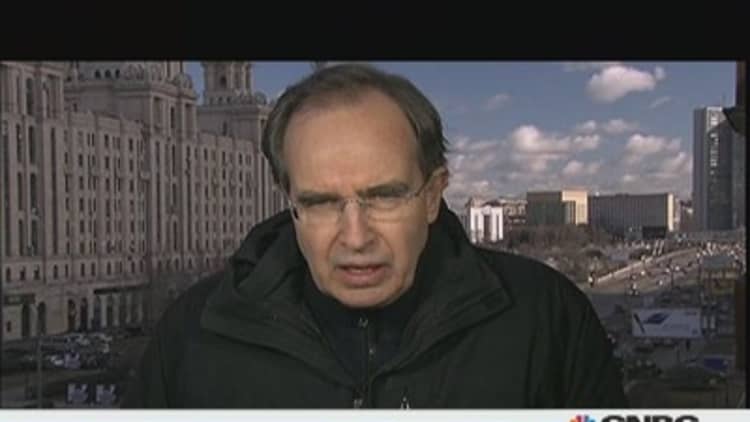Lingering worries about Chinese growth may be curbing investor sentiment, but it was concerns over Ukraine that accentuated a flight to "safe havens" on Wednesday, as global stock markets hit the brakes.
A referendum looms large in the Ukrainian region of Crimea, with Ukraine officials speaking of plans to raise a new national guard to protect against internal and external threats.
The G-7 group of major industrialized countries issued a statement on Wednesday saying it would not recognize the results of the referendum. They also said that any steps by Russia to annex Ukraine's Crimea region would result in "further action".
(Read more: Don't change Ukraine's borders: Swedish minister)
Russian stocks on the blue-chip MICEX index fell 2.6 percent on Wednesday, after clocking up declines of more than 2 percent on Tuesday. Shares of Russian lender VTB Bank fell 5.3 percent, while telecom company MegaFon slipped 2.6 percent.
"Markets will remain jittery about Ukraine, ahead of the Crimea referendum this weekend, and the threat of sanctions from the West," Michala Marcussen, global head of economics at Societe Generale, said in a note on Wednesday.
(Read more: Europe shares slump on China, Ukraine fears)
The dollar continued to gain ground against the ruble and the Russian finance ministry had to postpone another government bond auction on Tuesday evening due to unfavorable market conditions.
"Safe havens" saw some buying, with spot gold climbing for a second session on Wednesday to its highest level in four and a half months. The yield on the U.S. 10-year Treasury fell to 2.73 percent, as investors shunned riskier assets.

European bourses followed Russian stocks lower on Wednesday, with the pan-European Euro Stoxx 600 benchmark losing 1 percent over the course of the day. Both the French CAC 40 and the German DAX closed lower by around 1 percent and shares were also weaker in Asia, with Japan's Nikkei finishing down 2.6 percent.
Europe may be closer to events in Ukraine but Wall Street has not been immune to the risk aversion, the Dow industrials and the S&P 500 extending declines into a third day.
(Read more: Asian stocks lower on China jitters; Nikkei leads declines)
"Concerns about the Ukrainian situation are unlikely to go away given that EU leaders seem determined to implement some form of sanctions against allies of (Russian) President Vladimir Putin, which could, in turn, prompt a counter response," Michael Hewson, chief market analyst at CMC Markets, said in a note on Wednesday.
With the situation moving fast in Ukraine, traders will be keeping a keen eye on U.S. President Barack Obama's meeting with Ukrainian Prime Minister Arsenii Yatsenyuk at the White House on Wednesday.
It comes after Ukraine said it may mobilize 20,000 troops to protect the integrity of its territory. This compares with the 19,000 Russian troops that Ukraine officials say are still in Crimea.
But as well as the possibility of military force from the interim government, economic sanctions have also been touted by officials outside of the country.
The EU has handed trade incentives to Ukraine while investigating the possibility of tough sanctions against Russia. German and Polish officials said these could be implemented a day after Crimean citizens head to the polls on March 16 to vote on whether they want to become a federal subject of Russia.
(Read more: Yanukovich: Army will ignore orders)
Meanwhile, ousted Ukrainian leader Viktor Yanukovich insisted that he remained the country's legitimate president and commander-in-chief, saying he would return to Kiev and appeal to the armed forces to defy any "criminal orders" handed down by his foes.
—By CNBC.com's Matt Clinch. Follow him on Twitter @mattclinch81.


